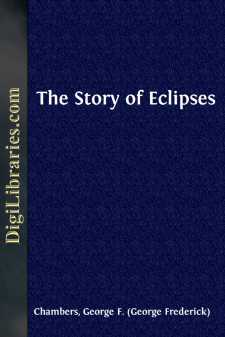Categories
- Antiques & Collectibles 13
- Architecture 36
- Art 48
- Bibles 22
- Biography & Autobiography 813
- Body, Mind & Spirit 142
- Business & Economics 28
- Children's Books 14
- Children's Fiction 11
- Computers 4
- Cooking 94
- Crafts & Hobbies 4
- Drama 346
- Education 46
- Family & Relationships 57
- Fiction 11829
- Games 19
- Gardening 17
- Health & Fitness 34
- History 1377
- House & Home 1
- Humor 147
- Juvenile Fiction 1873
- Juvenile Nonfiction 202
- Language Arts & Disciplines 88
- Law 16
- Literary Collections 686
- Literary Criticism 179
- Mathematics 13
- Medical 41
- Music 40
- Nature 179
- Non-Classifiable 1768
- Performing Arts 7
- Periodicals 1453
- Philosophy 64
- Photography 2
- Poetry 896
- Political Science 203
- Psychology 42
- Reference 154
- Religion 513
- Science 126
- Self-Help 84
- Social Science 81
- Sports & Recreation 34
- Study Aids 3
- Technology & Engineering 59
- Transportation 23
- Travel 463
- True Crime 29
The Story of Eclipses
Categories:
Description:
Excerpt
INTRODUCTION.
It may, I fear, be taken as a truism that “the man in the street” (collectively, the “general public”) knows little and cares less for what is called physical science. Now and again when something remarkable happens, such as a great thunderstorm, or an earthquake, or a volcanic eruption, or a brilliant comet, or a total eclipse, something in fact which has become the talk of the town, our friend will condescend to give the matter the barest amount of attention, whilst he is filling his pipe or mixing a whisky and soda; but there is not in England that general attention given to the displays of nature and the philosophy of those displays, which certainly is a characteristic of the phlegmatic German. However, things are better than they used to be, and the forthcoming total eclipse of the Sun of May 28, 1900 (visible as it will be as a partial eclipse all over Great Britain and Ireland, and as a total eclipse in countries so near to Great Britain as Spain and Portugal, to say nothing of the United States), will probably not only attract a good deal of attention on the part of many millions of English-speaking people, but may also be expected to induce a numerically respectable remnant to give their minds and thoughts, with a certain amount of patient attention, to the Science and Philosophy of Eclipses.
There are other causes likely to co-operate in bringing this about. It is true that men’s minds are more enlightened at the end of the 19th century than they were at the end of the 16th century, and that a trip to Spain will awaken vastly different thoughts in the year 1900 to those which would have been awakened, say in the year 1587; but for all that, a certain amount of superstition still lingers in the world, and total eclipses as well as comets still give rise to feelings of anxiety and alarm amongst ill-educated villagers even in so-called civilized countries. Some amusing illustrations of this will be presented in due course. For the moment let me content myself by stating the immediate aim of this little book, and the circumstances which have led to its being written. What those circumstances are will be understood generally from what has been said already. Its aim is the unambitious one of presenting in readable yet sound scientific language a popular account of eclipses of the Sun and Moon, and (very briefly) of certain kindred astronomical phenomena which depend upon causes in some degree similar to those which operate in connection with eclipses. These kindred phenomena are technically known as “Transits” and “Occultations.” Putting these two matters entirely aside for the present, we will confine our attention in the first instance to eclipses; and as eclipses of the Sun do not stand quite on the same footing as eclipses of the Moon, we will, after stating the general circumstances of the case, put the eclipses of the Moon aside for a while.
CHAPTER II.
GENERAL IDEAS.
The primary meaning of the word “Eclipse” (á¼âðλειψις) is a forsaking, quitting, or disappearance....


